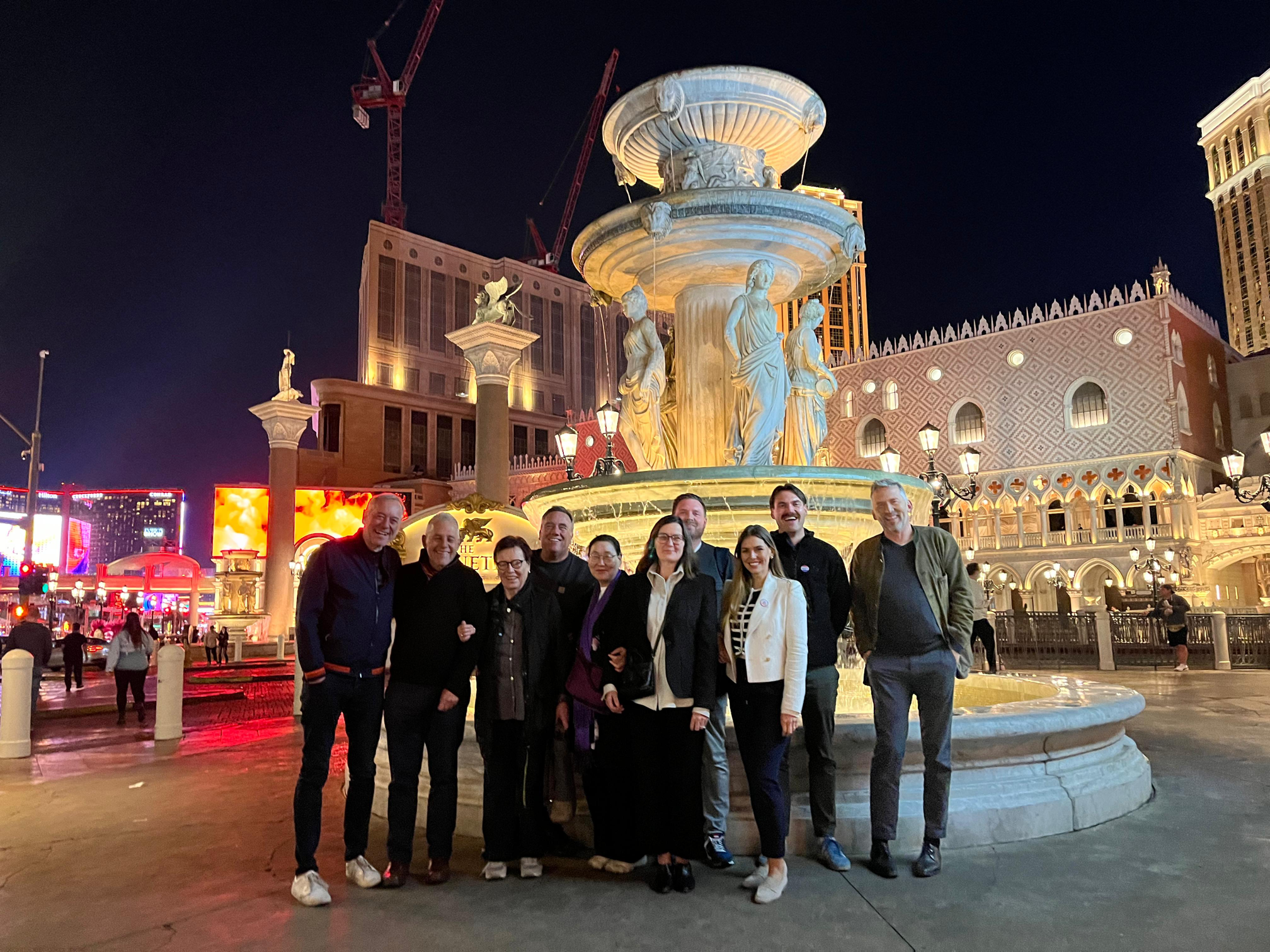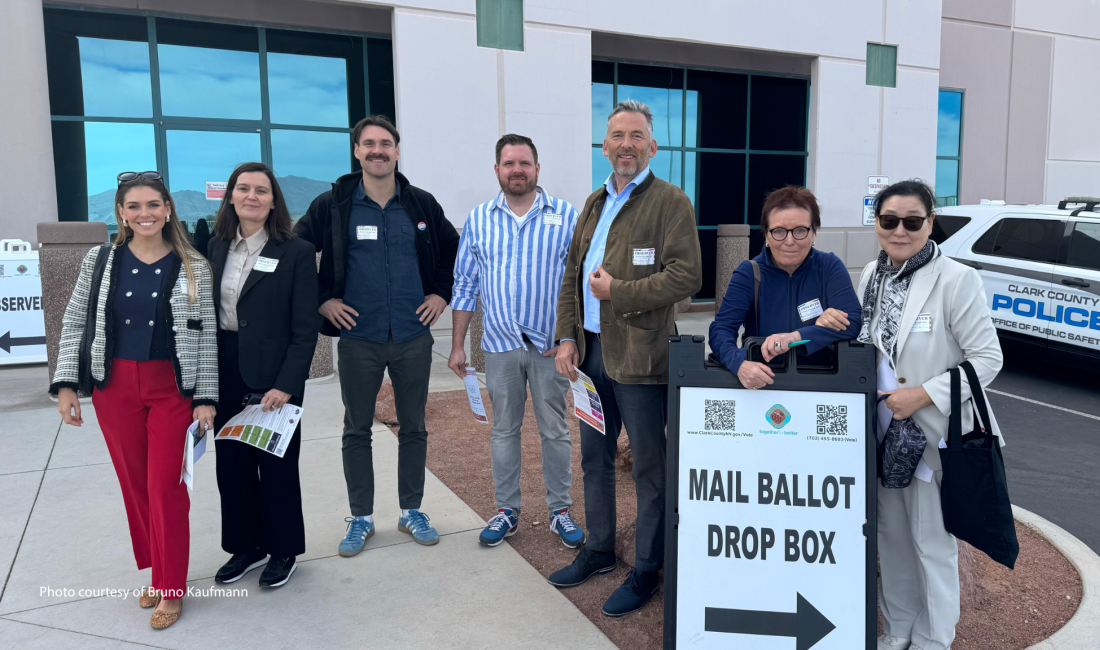Also: Bogota and Mumbai advances, beyond-human experiments and a democracy capital switch.
This is the monthly newsletter of Democracy Local. To subscribe to this newsletter, please email joe@democracylocal.com.
American elections are local elections. There is no national election administration, because there are no national elections. Even the presidential race is a series of state contests. And the voting is administered locally at the county level.
I spent the week leading up to the U.S. elections driving overseas colleagues (from Europe and Asia) around Arizona, Nevada and Georgia for meetings with democracy practitioners at all levels. You can learn a lot from visiting your own country with foreigners; my colleagues were impressed by the people and institutions we encountered, and the prosperity and beauty of the country. But they also were stunned by all the money and time we devote to our toxic national politics.
Between long drives and listening to the radio (Helen Reddy’s “You and Me Against the World” was in heavy rotation), our group visited the local government offices that administer elections.
The visits were sobering. The facility for opening and counting ballots in Maricopa County, Arizona, felt like a military headquarters, surrounded by fencing and concrete barriers—a setup that responded to years of threats against elections and election workers.
Our visit to the office of the Secretary of State of Georgia, the top elections official, was called off by a bomb threat at the State Capitol.
But local election workers were impressive. Poll workers in all three states were open and transparent about their work.
My lasting memory, however, may be of the North Las Vegas warehouse where Clark County election officials process and count ballots. The care of the workers, who work in pairs (one Democrat and one Republican typically, sometimes an independent and one of the party members), shone through.
My overseas colleagues marvelled at the extra steps taken to make sure votes are counted. If a signature on a mail ballot envelope doesn’t match the signature on file with a voter registration, Clark County contacts the voter to check if they had voted (signatures change) and gives them the chance to resolve the problem. And when mail ballots come in wet or damaged, poll workers, working in those bipartisan pairs, examine it closely and create a new ballot that reflects the voter intent and can be counted.
“Amazing,” said one colleague. “In Germany, we would just throw it in the trash.”
Of course, photos of the process of creating a ballot to replace a damaged ballot have spurred conspiracy theories about poll workers filling out ballots themselves. Such conspiracies, and the election denial that has become commonplace in the U.S., infuriated my colleagues. It also seemed impossible. The U.S. has no central repository or county of votes. Its election system is distributed among thousands and thousands of local operations. No conspiracy to fix the votes is logically possible. (This is not exclusive to the U.S., one colleague noted; some European states work the same way).
Which is why local democracy prevails, against all the doubts and madness of the world.
BUT LOCAL DEMOCRACY AND GOVERNMENT NEED DEFENSE.
In recent columns, I’ve been wrestling with how to defend democracy against attacks. Answers are local, and sub-national.
Here’s a column on the coastal commission with the guts to fight Elon Musk (and other rich and power people, including U2 guitarist The Edge.
And here is my appeal for a global coalition of local governments and organisations to counter the network of right-wing authoritarian politicians and parties.
MANY UTOPIAS, ONE PRIZE
At the International Observatory of Participatory Democracy conference in Valongo, Portugal, the Mexico City borough of Iztapalapa took home the top prize, for democratic innovation, for 16 “utopias,” free and accessible developments that disrupt patterns and revive civic life and local community.
DATA AND INFO
Claudia Chwalisz and Lucy Reid, via Democracy Next, have a very good paper detailing the extent of experiments in Europe on “more-than-human governance”—that is, attempts to create constitutions and democratic systems to represent other living things.
ASIA CHRONICLES
A terrific report from Asia Democracy Chronicles details a three-day jirga in Pakistan to deal with scary local problems, from land grabs to targeted killings.
READING
Local ‘Boss Trumps.’ Steven Hill, writing at Democracy SOS, digs into research into 200 Democratic counties that switched to Trump. What do they have in common? Local political cultures of bossism and authoritarianism.
China, like virtually every society on earth, has a problem with a lack of trust in government. This smart paper, built on ten national surveys, finds that the best way to improve trust in government is not to talk about trust in government—but to improve local government performance. A paper from Tanzania reaches a similar conclusion.
Can we pick up and move cities because of climate change? A piece at Zócalo Public Square takes us back to ancient times to say: yes, moving cities is possible, but the costs are high.
How do you achieve local autonomy? In a major essay originally published by Democracy Local, CC Marin uses the case of California to answer that question.
Welcome to The Future of Where a terrific new Substack from the local government practitioner and scholar Bill Fulton.
WATCHING
Why, in this desperate and dispiriting year of conflict-ridden elections, I find comfort in visiting a small town that is great at local democracy. This is a lecture given for the Thomas Mann House’s voices of democracy series.
A short film, debuting at Democracy Local, tells the story of “Big Local” in an English town.
FROM RESEARCHERS TO LOCAL OFFICIALS
Marijke Synhaeve, Dan Heap, and Naoimh McMahon—all academic researchers—ended up running for office in different parts of Europe—one as a district councillor in Preston (in northwest England), another as a councillor in Edinburgh, and a third as a member of the Netherlands parliament. Recently, they jointly published a paper on the researcher-to-politician path.
They all found that research had less impact on policymakers and politicians than they hoped. In many cases, relevant research was available but didn’t reach them. Also, lobbyists and interest groups were much better at using research to make arguments than the producers of research themselves.
Finally, research doesn’t help since politicians are rarely present at the creation of the programs or institutions they govern, and thus don’t have much hand in shaping them. “I hadn’t fully appreciated how, as a new member of the council, you arrive in the middle of long-term programmes of capital spending,” wrote the Preston district council member
DEMOCRACY EVENTS:
On November 20, Participedia offers a “teaching café” on people-centred research. You can RSVP here.
A November 29 event looks at how to “decolonize” democratic innovations. RSVP here.
On January 31 at 7p Pacific time, I’ll be interviewing philosopher of democracy Robert Talisse at Book Soup in Los Angeles about Civic Solitude: Why Democracy Needs Distance, the third book in his masterful democratic trilogy.
Starting February 3, Consul Democracy will hold its conference in Gran Canaria.
Local democracy is failing to solve the problem of housing around the world. Some 3 billion people are housing insecure. The recent World Urban Forum, held in Cairo, produced a call for housing, and for local democratic action.
NEW THINKING
Mumbai has spent years replacing its infamous slums with Cooperating Housing Society developments, in which people can own their housing space by purchasing shares in the CHS. A new paper looks at the governance of CHS development, which can inspire both strong democratic participation and protests against dispossession.
Bogota, Colombia held what might be the world’s first “meta-deliberative” citizens assembly, according to the Democracy R&D network. The deliberation, convened by the mayor, focused on the design of future citizens assemblies. Should the people selected by lottery to participate in such assemblies control the design themselves? In other news, Bogotá will host its first large-scale citizens assembly in 2025, with 150 citizens deliberating over 15 days.
Boulder, Colorado is revamping the organization and style of its public meetings, via the National Civic League.
PASSING THE BATON
The European Capital of Democracy moves this month from Barcelona (Catalunya), the very first such city holding the title, to the second European Capital of Democracy, Vienna (Austria). In a joint statement, the leaders of the two cities committed to pursue participatory and inclusive innovation and to continue their cooperation and contributions within the European City Network. Meanwhile, the selection process for the 2026 European Capital of Democracy process is in full swing: a citizens’ jury, to which you can apply, will make its decision in spring 2025.
(UGLY) DEMOCRACY QUOTE FOR THIS MONTH
“Democracy is talking itself to death. The people do not know what they want; they do not know what is best for them. There is too much foolishness, too much lost motion. I have stopped the talk and the nonsense. I am a man of action. Democracy is beautiful in theory; in practice, it is a fallacy. You in America will see that someday.”
—Benito Mussolini
LINKS TO LOCAL DEMOCRACY RESOURCES AND PARTNERS
Democracy International and Democracy Community
Federation for Innovation in Democracy-Europe and FIDE North America
United Cities and Local Governments
International Observatory of Participatory Democracy
ASU Participatory Governance Initiative
Taiwan Foundation for Democracy
National Civic League’s Center for Democracy Innovation
Journal of Deliberative Democracy
Local Government Information Unit
The Future of Where




